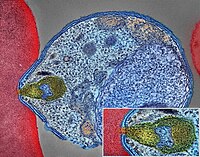
Photo from wikipedia
Erythropoiesis and megakaryo-/thrombopoiesis occur in the bone marrow proceeding from common, even bipotent, progenitor cells. Recently, we have shown that protective vaccination accelerates extramedullary hepatic erythroblastosis in response to blood-stage… Click to show full abstract
Erythropoiesis and megakaryo-/thrombopoiesis occur in the bone marrow proceeding from common, even bipotent, progenitor cells. Recently, we have shown that protective vaccination accelerates extramedullary hepatic erythroblastosis in response to blood-stage malaria of Plasmodium chabaudi. Here, we investigated whether protective vaccination also accelerates extramedullary hepatic megakaryo-/thrombopoiesis. Female Balb/c mice were twice vaccinated with a non-infectious vaccine before infecting with 106 P. chabaudi-parasitized erythrocytes. Using gene expression microarrays and quantitative real-time PCR, transcripts of genes known to be expressed in the bone marrow by cells of the megakaryo-/thrombocytic lineage were compared in livers of vaccination-protected and unprotected mice on days 0, 1, 4, 8, and 11 p.i. Livers of vaccination-protected mice responded with expression of megakaryo-/thrombocytic genes faster to P. chabaudi than those of unvaccinated mice, evidenced at early patency on day 4 p.i., when livers exhibited significantly higher levels of malaria-induced transcripts of the genes Selp and Pdgfb (p-values < 0.0001), Gp5 (p-value < 0.001), and Fli1, Runx1, Myb, Mpl, Gp1ba, Gp1bb, Gp6, Gp9, Pf4, and Clec1b (p-values < 0.01). Together with additionally analyzed genes known to be related to megakaryopoiesis, our data suggest that protective vaccination accelerates liver-intrinsic megakaryo-/thrombopoiesis in response to blood-stage malaria that presumably contributes to vaccination-induced survival of otherwise lethal blood-stage malaria.
Journal Title: Vaccines
Year Published: 2022
Link to full text (if available)
Share on Social Media: Sign Up to like & get
recommendations!